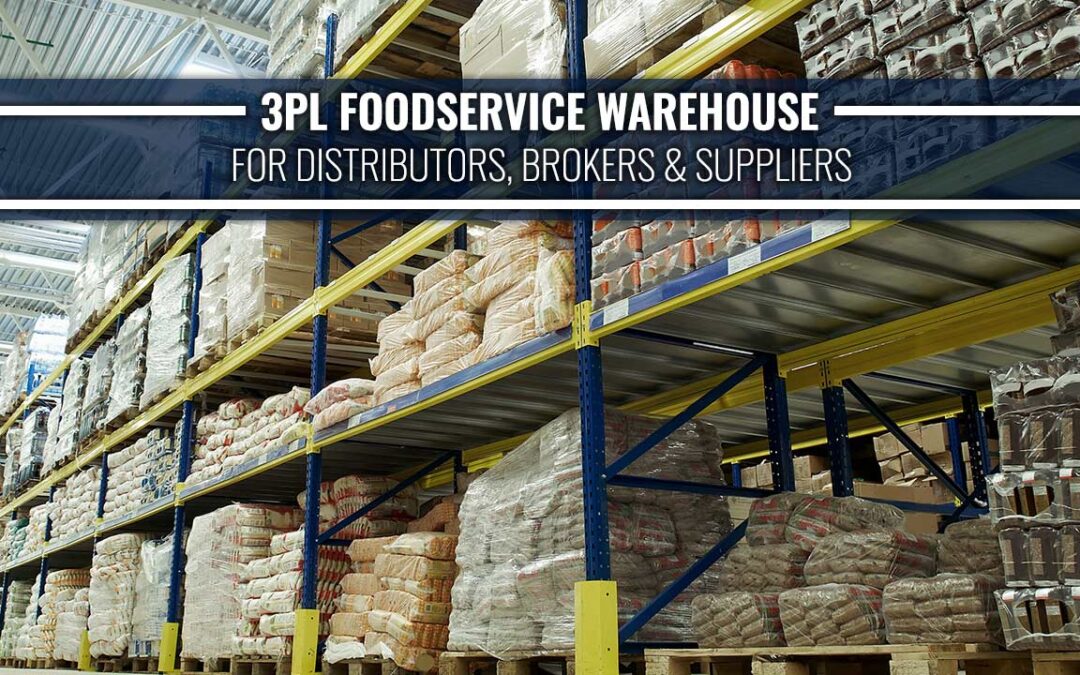Whether you’re a food distributor, broker, or manufacturer, food distribution requires the right 3PL solutions— learn how a foodservice warehouse can help!
The days of when consumers were not so much worried as to when they get their product, but just that they receive their product are gone! Consumer expectations are at an all-time high with regards to how quickly they get their product or if it is at the local store when they want it and or need it.
These factors put a tremendous pressure on brokers, food manufacturers, and food distributors to make sure that customer expectations are met and when you are dealing with food any disruption in the supply chain caused by an improperly run food service warehouse can cost time, money and unhappy customers.
4 Factors for Food Storage Supply Chain
A 3PL food storage warehouse must be able to adhere to and execute in 4 major areas to help ensure that there are no disruptions in the supply chain for the brokers, distributors and food manufacturers.
In this post we’ll cover these 4 factors to help you select the right warehouse for your food products:
- Having the proper licensing and registrations in place.
- Having a Preventive Controls Qualified Individual (PCQI) that will ensure that all food safety guidelines and procedures are followed and in place to ensure that “all food products” are safe for consumption by the end consumer.
- Having a proper Warehouse Management System (WMS) in place to control the food coming in and out of the warehouse… especially with regards to Lot Control.
- Having a foodservice warehouse that can also provide transportation or final mile delivery will keep the supply chain running even more efficiently for your brokers, distributors and food manufacturers (as we know time is of the essence with high consumer expectations).
-
The Importance of FDA-Approved Warehousing
It is critical that the 3PL food storage warehouse that you choose to partner with has the proper licensing and registration, to avoid a major disruption in the supply chain of your products!
All Food Storage and distribution facilities must register with the Food and Drug Administration (FDA). The FDA is a line of defense for the end consumer of food products to help ensure that the food products are safe for human consumption.
The 3PL food storage warehouse must constantly update and inform the FDA of any changes in the warehouse operations or products stored at the facility. The FDA needs to know the types of foods being stored along with other products being stored in the warehouse to make sure that there are no possibilities of cross contamination or hazards that could cause any adulteration to the food that will in the end be distributed to the end consumer.
How does this impact the distributor, brokers, and suppliers?
If the food storage warehouse has a complaint, quality issue, or the FDA decides to do a random audit and the proper licensing and safeguards are not in place; the FDA can shut the food distribution warehouse down.
How long the FDA chooses to shut down the facility could vary from a couple of days to possibly months! Now your food products are not going to get to your customers in a timely manner— disrupting your supply chain, resulting in lost time, money, brand degradation and in the end unhappy customers.
It is also important to note that every state has different guidelines of registration that must be addressed that are similar to the FDA. Make sure that the food storage warehouse is also compliant with their state licensing and registration.
-
Does Your 3PL Food Storage Warehouse Have a Preventive Controls Qualified Individual (PCQI)?
Having a PCQI individual on staff, lets you know that the warehouse of your choice takes their food service operations very seriously.
A PCQI has to undertake extensive training and pass a rigorous test to receive this accreditation. The PCQI individual will make sure that the warehouse is operating under the current Good Manufacturing Practices (GMPs) and maintaining the proper documentation to avert any shut down of the facility by the FDA or a local government entity.
PCQI Responsibilities
- Maintain proper licensing with the FDA and local governments.
- Develop Standard Operating Procedures (SOPs) for the receiving, storage, and distribution of the food products.
- Train the staff on the importance of following GMPs with regards to warehouse cleanliness, pest control, sanitation schedules, personal hygiene, spill cleanups, and practices to prevent the cross contamination or adulteration of any food products.
- Assign and oversee that the aforementioned tasks are being carried out daily by the staff.
The PCQI is critical to prevent a disruption in the supply chain of the brokers, distributors and suppliers.
-
Food Inventory Control for Warehousing
If you are looking at 3PL food service warehouses, make sure that they are using a Warehouse Management System (WMS) to control your food inventory!
A proper WMS system will track the storage locations, quantities, individual SKUs and more importantly provide “Lot Control”. All of these factors will help ensure that when one of your food products is ordered that the correct SKU, amount and lot number are pulled from to fulfill the order for your customer but more importantly, that proper records can be tracked and saved.
Why is this so important? Imagine you are a food supplier or manufacturer and your finished goods are being stored in the 3PL foodservice warehouse and all of a sudden, a quality control issue (possible contamination or adulteration of ingredients) was found with some of the product that the warehouse is now storing.
Hopefully, the food product has yet to be shipped to the end consumer but either way the product needs to be tracked down, retrieved, and quarantined. The only way to accurately do this is with lot control and your WMS. E. Coli, Salmonella, and Listeria are only a few of the bacteria-born viruses that you as a broker, supplier, or food distributor “CANNOT” have infecting your end consumers; the ramifications could be irreversible. A WMS system is one of the best safeguards to help stop any outbreak.
-
Food Distribution Transportation for Delivery
The final criteria when choosing the right 3PL foodservice warehouse that we would highly recommend to keep the supply chain moving: Does the 3PL have their own trucks?
If the 3PL has their own trucks, it is a total bonus!
As we discussed earlier, with consumer expectations at an all-time high with wanting products quickly, you want to keep your product moving fast and efficiently. Many food products are seasonal, have a certain shelf life, or can have random spikes in consumer demand. This means that 1 or 2 days in shipping times can make a huge difference in the satisfaction of your customers.
A 3PL that has their own trucks will be able to flex and adapt to make sure that they have a truck available to deliver your product always and on time. This will eliminate the need for relying on the capacity and timing of another carrier to deliver your product to your end consumer. This is basically a safeguard that will allow for your supply chain to stay efficient and on time!
Food Service Warehouse in St. Louis & Portland
If you are a food Distributor, broker, or supplier, and are looking for the right 3PL food storage warehouse to keep your supply chain moving efficiently, your food safe, and your end customer happy— then choose a warehouse that will adhere to the 4 major factors that we have discussed. You and your customers will be glad that you did.
Contact our food storage warehouse team in St. Louis or Portland for a free quote!
Get a free warehousing quote
Get a free warehousing quote

